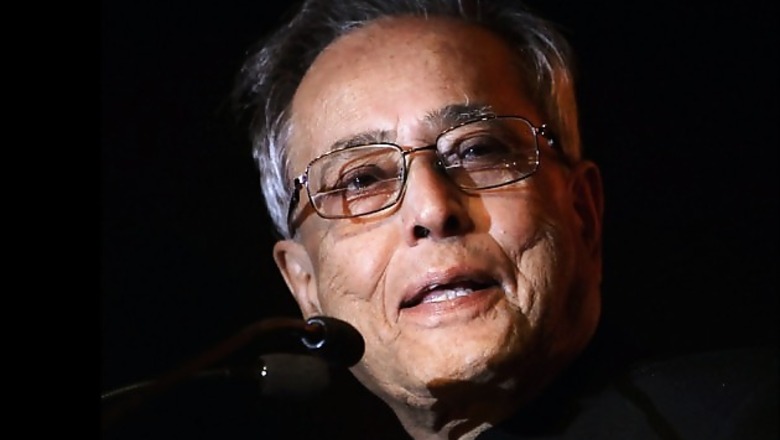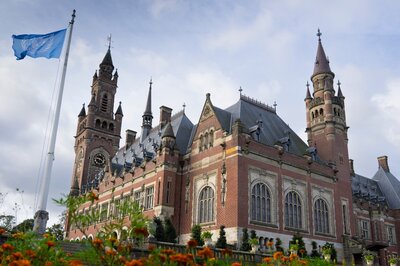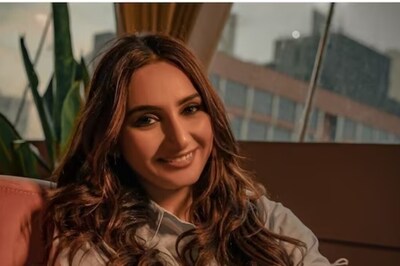
views
New Delhi: Hailed as the party's chief troubleshooter and a 'man for all seasons', the veteran warhorse Pranab Mukherjee finds himself in the middle of a new battle. As the race to the Rashtrapati Bhawan heats up, all eyes are on the 76-year-old leader from West Bengal - undoubtedly one of the most charismatic political survivors in India - on how he fights what is perhaps the last and the most significant battle of his illustrious life.
Pranab Mukherjee, son of Kamada Kinkar Mukherjee and Rajlakshmi Mukherjee, was born at Mirati village near Kirnahar in Birbhum, West Bengal on Dec 11, 1935. His father was in the Indian National Congress who later became a member of the West Bengal Legislative Council. After finishing his education at Suri Vidyasagar College and a degree in law from the University of Calcutta, Pranab started his career as a college teacher. He later became a journalist with the Bengali newspaper Desher Dak. Pranab Mukherjee married Suvra Mukherjee on July 13, 1957 and has two sons, Abhijit and Indrajit and a daughter.
Following his father's footsteps, Pranab made his foray into politics in 1969 when he was elected a member of the Rajya Sabha from the Congress Party. (He has since been re-elected to the Rajya Sabha in 1975, 1981, 1993 and 1999.) It was the beginning of a remarkable career in politics which has now spanned almost four decades and has been privy to India's transtition from a socialist economy to the post-globalisation market economy. Pranab da had a major role to play in this transition.
The ministries he headed or worked with in the 1970s were crucial in terms of industrial development and economy. Take a look: 1973-1974: Deputy Minister, Industrial Development; 1974: Deputy Minister, Shipping, and Transport; 1974-1975: Minister of State for Finance; and, 1975-1977: Minister of Revenue and Banking (Independent Charge).
Pranab's first stint as the Finance Minister was in 1982, when he held the post for two years. He brought about fiscal reforms and freed exports from government controls. He also brought in vital foreign exchange. His feat with the country's finance was so appreciated that he was even rated as the World's Best Finance Minister according to a survey by Euromoney magazine.
In the mid-80s, the Congressman was forced to quit the party. Following Indira Gandhi's assassination in 1984, her son Rajiv Gandhi came to power. Pranab felt slighted and ignored despite his loyalty towards the party. He quit Congress in protest and formed the Rashtriya Samajwadi Congress. The outfit couldn't make much breakthrough and Pranab merged it with Congress in 1989 following a settlement with Rajiv Gandhi.
Pranab's career now gathered momentum. He was appointed the Deputy Chairman of the Planning Commission in 1991 and and subsequently was made Minister of External Affairs (1995-96) during the P V Narasimha Rao government. In his long career, the 'man of all seasons' (and ministries) has had the distinction of heading varied portfolios like Defence, Finance, External Affairs, Revenue, Shipping, Transport, Communication, Economic Affairs, Commerce and Industry. He was also voted as an Outstanding Parliamentarian in 1997 and was honoured with India's second highest civilian award Padma Vibhushan in 2008.
It is under the Manmohan Singh era during the UPA I and UPA II rule that Pranab da's stature within and outside Congress grew as the party's most dependable crisis manager who has, in his long career, mastered the art of political networking. His art came handy for Congress in the era of coalition politics. He is known to have friends in almost every major political party.
It's therefore an irony that the party's chief firefighter finds himself caught in a political crossfire over what has now become an edge-of-the-seat race to the Rashtrapati Bhawan.
Pranab's political career
July 1969: Elected to Rajya Sabha
1973-1974: Union Deputy Minister, Industrial Development
1974-1974: Union Deputy Minister, Shipping and Transport
1974-1975: Union Minister of State, Finance
July 1975: Re-elected to Rajya Sabha (2nd term)
1975-1977: Union Minister, Revenue and Banking (Independent Charge)
1978-1980: Deputy Leader, Congress Party, Rajya Sabha
1978-1979: Treasurer, All India Congress Committee
1978-1986: Member, Central Parliamentary Board, AICC
1980-1982: Union Minister, Commerce and Steel and Mines
1980-1985: Leader of the House, Rajya Sabha
Aug 1981: Re-elected to Rajya Sabha (3rd term)
1982-1984: Union Cabinet Minister, Finance with additional charge of Ministry of Commerce and Supply
1987-1989: Chairman, Economic Advisory Cell, AICC
1991-1996: Deputy Chairman, Planning Commission
1993-1995: Union Cabinet Minister, Commerce
1993: Re-elected to Rajya Sabha (4th term)
1995-1996: Union Cabinet Minister, External Affairs
1996-2003: Member, Business Advisory Committee, Rajya Sabha
1996-1999: Member, Consultative Committee for External Affairs
1999: Re-elected to Rajya Sabha (5th term)
Aug 2000 till date: President, West Bengal Pradesh Congress Committee
13 May 2004: Elected to 14th Lok Sabha
2004-2006: Union Cabinet Minister, Defence
2006-2009: Union Cabinet Minister, External Affairs
2009-till date: Union Cabinet Minister, Finance
20 May 2009: Re-elected to 15th Lok Sabha (2nd term)




















Comments
0 comment